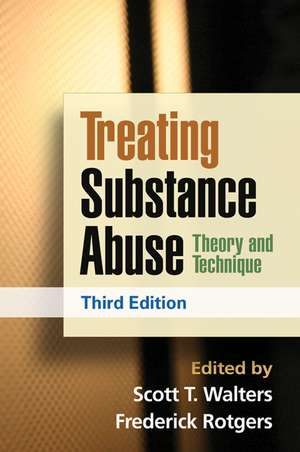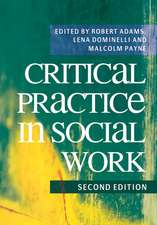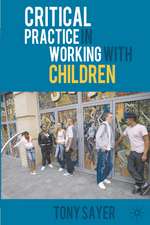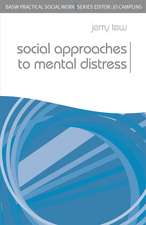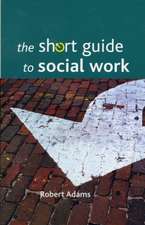Treating Substance Abuse, Third Edition: Theory and Technique
Editat de Scott T. Walters, Frederick Rotgersen Limba Engleză Hardback – 10 feb 2012
This state-of-the-art text and clinical resource captures the breadth of current knowledge about substance abuse and its treatment. For each of the major evidence-based treatment approaches, a chapter on basic assumptions and theories is followed by a chapter on clinical applications, including illustrative case material. Expert contributors cover motivational, contingency management, cognitive-behavioral, 12-step, family, and pharmacological approaches. Concluding chapters discuss effective ways to integrate different treatments in a range of clinical settings.
New to This Edition
*Reflects significant advances in research and clinical practice.
*Chapter on the biology of substance use disorders.
*Chapter on an additional treatment setting: primary care.
*Chapter on case management.
Preț: 566.52 lei
Preț vechi: 596.34 lei
-5% Nou
Puncte Express: 850
Preț estimativ în valută:
108.46€ • 113.16$ • 90.91£
108.46€ • 113.16$ • 90.91£
Carte tipărită la comandă
Livrare economică 12-26 martie
Preluare comenzi: 021 569.72.76
Specificații
ISBN-13: 9781462502578
ISBN-10: 1462502571
Pagini: 436
Dimensiuni: 152 x 229 x 41 mm
Greutate: 0.71 kg
Ediția:Revizuită
Editura: Guilford Publications
Colecția Guilford Press
ISBN-10: 1462502571
Pagini: 436
Dimensiuni: 152 x 229 x 41 mm
Greutate: 0.71 kg
Ediția:Revizuită
Editura: Guilford Publications
Colecția Guilford Press
Public țintă
Professional Practice & DevelopmentCuprins
Introduction, Scott T. Walters and Frederick Rotgers
1. Theories of Motivation and Addictive Behavior, Gary S. Rose and Scott T. Walters
2. Motivational Interviewing in Practice, Erin M. Tooley and Theresa B. Moyers
3. The Behavioral Economics of Substance Abuse, James G. Murphy, James MacKillop, Rudy E. Vuchinich, and Jalie A. Tucker
4. Contingency Management in Substance Abuse Treatment, Jesse Dallery, Alan J. Budney, and Steven E. Meredith
5. Cognitive-Behavioral Theories of Substance Abuse, Frederick Rotgers
6. Behavioral Treatment Techniques for Psychoactive Substance Use Disorders, James S. Marinchak and Thomas J. Morgan
7. Theory of 12-Step-Oriented Treatment, John Wallace
8. Facilitating 12-Step Recovery from Substance Abuse, Joseph Nowinski
9. Theoretical Bases of Family Approaches to Substance Abuse Treatment, Barbara S. McCrady, Benjamin O. Ladd, and Kevin A. Hallgren
10. Family Therapy Techniques for Substance Abuse Treatment, Wendy K. K. Lam, Timothy J. O'Farrell, and Gary R. Birchler
11. Neurobiological Bases of Addiction Treatment, Phillip H. Chung, Julie D. Ross, Sidarth Wakhlu, and Bryon Adinoff
12. Integrating Psychotherapy and Pharmacotherapy in Substance Abuse Treatment, Kathleen M. Carroll and Brian D. Kiluk
13. Addressing Substance Abuse in Primary Care Settings: Screening and Brief Intervention, Kristen L. Barry and Frederic C. Blow
14. Integration of Theory, Research, and Practice: A Clinician's Perspective, Edward Rubin
15. Case Management in Substance Abuse Treatment, Allen ZwebenNotă biografică
Scott T. Walters, PhD, is Professor of Behavioral and Community Health in the School of Public Health at the University of North Texas Health Science Center. His research focuses on the use of motivational interviewing and other brief interventions to help people make changes in substance abuse and other problem behaviors. Widely published, Dr. Walters has acted as a consultant for several agencies; is a frequent speaker to university, community, and medical groups; and has received national and international awards for his work integrating research and practice.
Frederick Rotgers, PsyD, ABPP, is Director of the Program for Motivation and Change at the Graduate School of Applied and Professional Psychology, Rutgers, The State University of New Jersey, and a psychologist in independent practice. He is a Fellow of the American Psychological Association (APA), is a past president of the Society of Addiction Psychology (APA Division 50), and is certified in clinical and cognitive and behavioral psychology by the American Board of Professional Psychology. The author or editor of numerous books on the assessment and treatment of substance use disorders, Dr. Rotgers is American Editor-in-Chief of the journal Addiction Research and Theory.
Recenzii
"The up-to-date third edition of this clinical resource and text covers state-of-the-art approaches to substance abuse treatment. Written for a broad audience, the book not only provides clear, concise descriptions of the most prominent theories and approaches, but also does an excellent job of bridging the gap between clinical concepts and research and actual clinical practice. This is an ideal classroom text for giving students and trainees in psychology, social work, counseling, and medicine a panoramic view of the field. It is equally informative for even the most seasoned practitioner."--Arnold M. Washton, PhD, Executive Director, Recovery Options, New York City and Princeton, New Jersey
"This volume is a terrific addition to the addiction bookshelf, particularly because it provides directed information about several of the newer forms of psychotherapy used in the treatment of substance use disorders, including motivational interviewing, contingency management, and family therapy. The editors have brought together experts in each approach to provide a work that is at once scholarly and readable. Vignettes of interactions with patients are included, as is a chapter on the neurobiology of addiction. This book will be useful not only for practitioners but also as a text for classroom learners."--Avram H. Mack, MD, Associate Chair for Quality and Safety, Children's Hospital of Philadelphia"All substance abuse treatment professionals trying to ensure that the treatments they deliver are current, science based, and empirically supported should read this book. Chapters highlight the unique concepts and strategies of each approach and, even more important, describe how to integrate different approaches into comprehensive, multicomponent treatment programming. I especially appreciate the third edition's more integrative focus on biological, psychological, social, and spiritual dimensions of the treatments, and the discussions of how to integrate pharmacotherapy and case management into psychosocial treatments. As we strive to make substance abuse treatments more effective and accountable, we are fortunate to have a volume providing guidance for understanding and implementing the best treatment strategies the field has to offer."--Carlo C. DiClemente, PhD, ABPP, Department of Psychology (Emeritus), University of Maryland, Baltimore County
"This text is an excellent choice for upper-division undergraduate or first-year graduate courses on addictions. It provides a balanced perspective across diverse theoretically informed models of practice; traditional and contemporary perspectives are equally honored. Highlights of the third edition include additional psychopharmacology material and a complementary chapter on the biology of addictions."--Timothy B. Conley, PhD, School of Social Work, University of Montana
"This ideal text and clinical guide focuses on evidence-based psychological and pharmacological interventions. Contributors are well-known addiction specialists. What makes this book unique is that it is a valuable resource for everyone from medical, psychological, nursing, and social work professionals to students and those seeking to become certified substance abuse counselors."--Linda C. Sobell, PhD, ABPP, President's Distinguished Professor, and Mark B. Sobell, PhD, ABPP, President's Distinguished Professor, College of Psychology, Nova Southeastern University
-A must for any practitioner or student that wishes to broaden [his or her] knowledge of assessment and treatment of substance abuse.--Journal of Social Work Practice in the Addictions, 12/15/2011"This ideal text and clinical guide focuses on evidence-based psychological and pharmacological interventions. Contributors are well-known addiction specialists. What makes this book unique is that it is a valuable resource for everyone from medical, psychological, nursing, and social work professionals to students and those seeking to become certified substance abuse counselors."--Linda C. Sobell, PhD, ABPP, President's Distinguished Professor, and Mark B. Sobell, PhD, ABPP, President's Distinguished Professor, College of Psychology, Nova Southeastern University
Descriere
This state-of-the-art text and clinical resource captures the breadth of current knowledge about substance abuse and its treatment. For each of the major evidence-based treatment approaches, a chapter on basic assumptions and theories is followed by a chapter on clinical applications, including illustrative case material. Expert contributors cover motivational, contingency management, cognitive-behavioral, 12-step, family, and pharmacological approaches. Concluding chapters discuss effective ways to integrate different treatments in a range of clinical settings.
